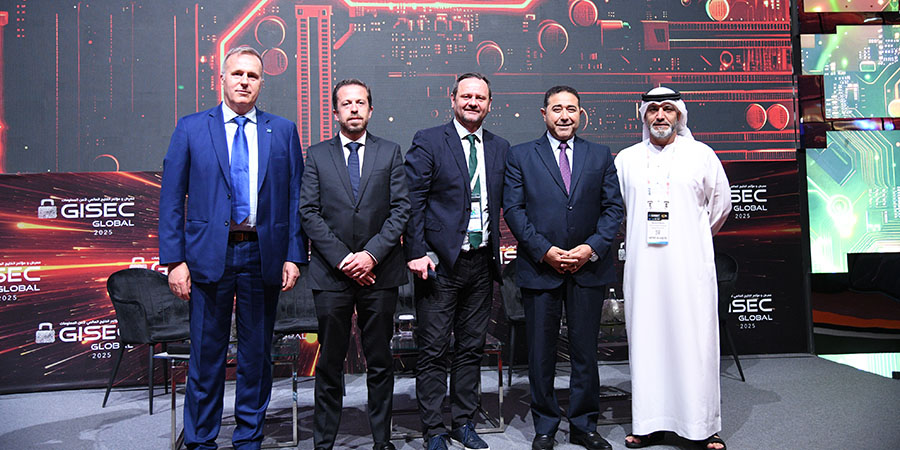A concluding panel at GISEC 2025, titled ‘Connectivity Panel: Securing the Expanded Attack Surface of 5G Networks,’ explored the unique cybersecurity challenges posed by 5G and edge computing. The discussion addressed key issues such as expanding attack surfaces, data privacy and security, supply chain security, and strategies for building a secure 5G ecosystem.
Experts from Switzerland, Portugal, Egypt, Canada, and the United Arab Emirates (UAE) gathered to spotlight how resilience must evolve alongside connectivity.
The panel was moderated by Orhan Osmani, Head of the Cybersecurity Division at the International Telecommunication Union (ITU), Switzerland. Osmani leads global cybersecurity initiatives across 193 member states, advancing secure connectivity worldwide.
The discussion began by referencing the recent power outage in Europe and the consequent disruption to communication networks. The panel sought to analyze the best approaches to safeguard critical infrastructure against such unforeseen incidents.
Latest at GISEC 2025: Government Leaders Outline Cyber Priorities for the Year Ahead
Portugal: Prioritizing Reserves in an Interconnected Energy-Communication Ecosystem
João Filipe Alves, Head of Security at the National Telecommunications Regulatory Authority (ANACOM), Portugal, emphasized the need for a comprehensive investigation into the outage.
“We must reassess critical infrastructure within the telecom sector,” he stated, highlighting existing European regulations and the interdependence between energy and communication systems.
Alves advocated for governments to prioritize reserves in essential sectors, including food, energy, and telecommunications. He stressed the importance of ensuring the reliability of Internet of Things (IoT) and information technology (IT) devices during emergency services, highlighting the need to maintain telecom antennas even during power failures.
In terms of protecting citizens' data, Alves called for stronger cross-sector cooperation and collaboration among national authorities. “In Portugal, we launched a sectorial Computer Security Incident Response Team (CSIRT) for the telecom sector,” he noted.
Technical experts need to understand how devices operate in each sector to enhance preparedness.
He also recommended specialized expertise to support telecom operators in securing customer databases and preventing cyberattacks.
Egypt: Strengthening Telecom Preparedness for National-Scale Outages
From a regulatory perspective, Dr. Ahmed Abdel Hafez, Executive Cybersecurity Consultant to the CEO of the National Telecommunication Regulatory Authority (NTRA), evaluated Egypt’s preparedness for large-scale outages.
We need to implement security by design and integrate security in the earliest stages of emerging technologies.
Hafez outlined Egypt’s efforts to build a 5G cybersecurity framework involving major telecom operators like Etisalat and Orange, covering aspects such as slicing, virtualization, and software-defined wide-area networks (SD-WAN). He also pointed to initiatives including national awareness campaigns and international cyber drills to improve incident recovery.
Hafez further emphasized personal data protection, noting that Egypt has established a dedicated center for privacy protection. “Personal awareness is key; people need to understand the importance of safeguarding their own data and preventing misuse,” he added.
Canada: Securing 5G-Driven Critical Infrastructure
Focusing on the impact of 5G edge operations on critical infrastructure, Goran Novkovic, Director of Industrial Cybersecurity at the Toronto Transit Commission (TTC), highlighted the need to secure Canada’s largest public transit system.
We operate a system of connected systems, and securing this ecosystem requires prevention, prediction, and detection.
He stressed the importance of “operational visibility”—the ability to extract and analyze data from connected systems to convert information into actionable knowledge. However, he noted persistent silos between operational teams and cybersecurity teams. “These teams must collaborate closely to bridge gaps and ensure comprehensive protection,” he urged.
UAE: Mobile Networks and 4G LTE Powering Public Safety
Lt. Colonel Dr. Hamad Al Nuaimi, Head of Telecommunication at Abu Dhabi Police GHQ, agreed with Novkovic, reiterating the need to secure 5G edge operations from a public safety and emergency services standpoint.
Recognized for pioneering critical communication technologies, including mobile telecom vehicles and 4G LTE implementation for public safety, Al Nuaimi highlighted the UAE’s emphasis on securing infrastructure for both emergency response and everyday life.
We must adapt to evolving challenges while maintaining flexibility.
He underscored the role of both public and private sectors, emphasizing the UAE government’s commitment to fostering collaboration between them. “Cyberattacks are increasing, and joint efforts are essential,” he warned.
He also reflected on the UAE’s broader connectivity goals such as addressing challenges in expanding access and ensuring affordable roaming and data services internationally.
The Standardized Key
The power outage in Europe has spotlighted the evolving threat landscape and rising complexity of 5G networks, necessitating the need for collaborative foresight. The panel jointly agreed on the importance of close international cooperation to harmonize service delivery, pricing, and cybersecurity standards.









